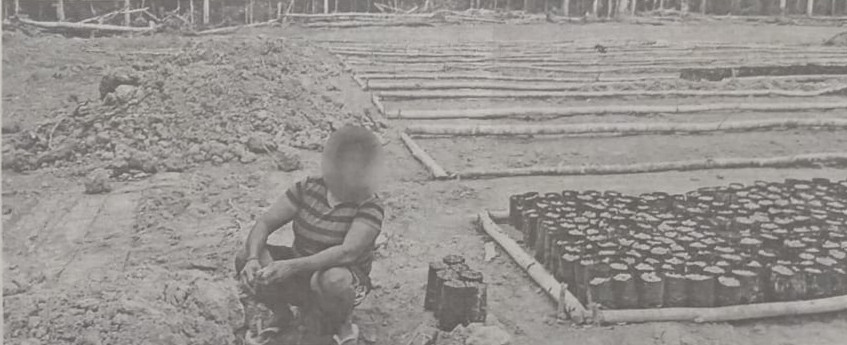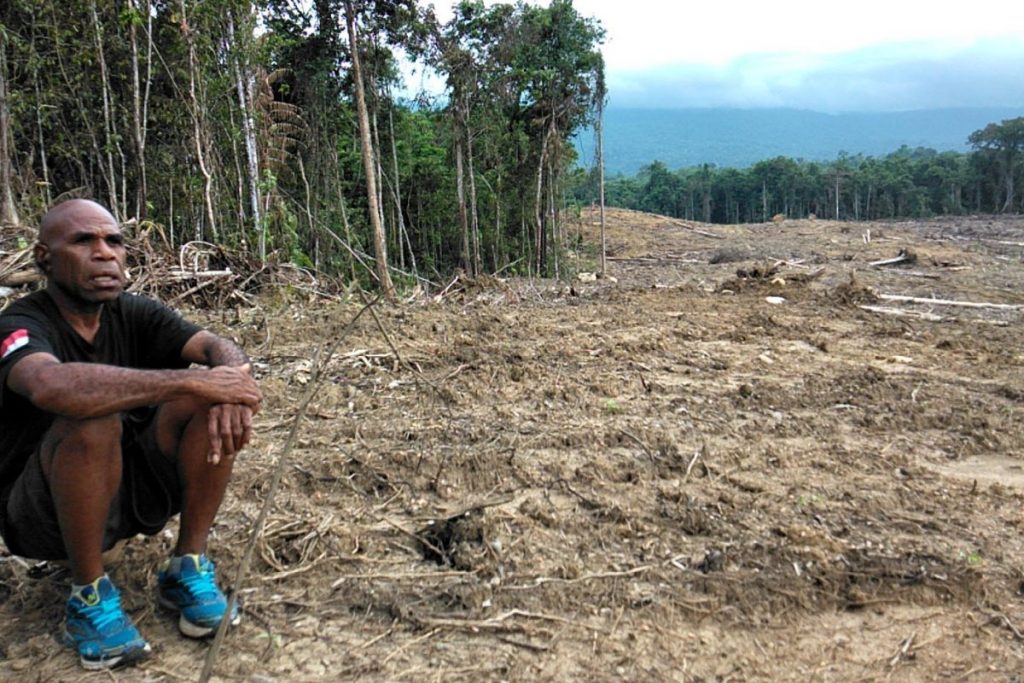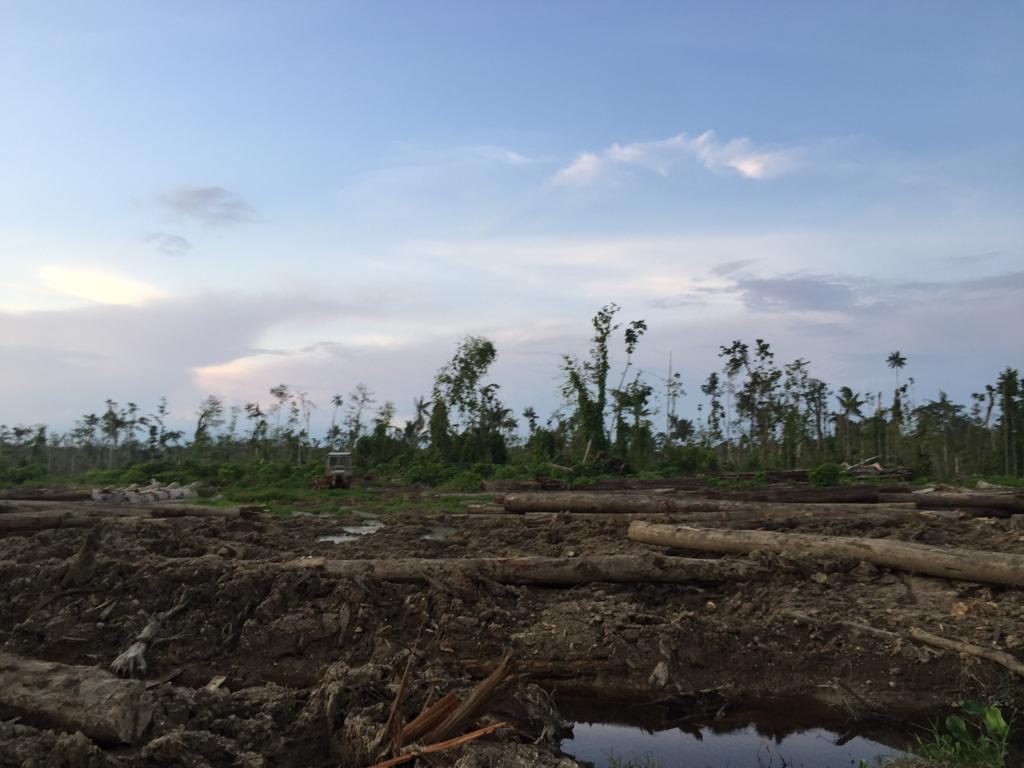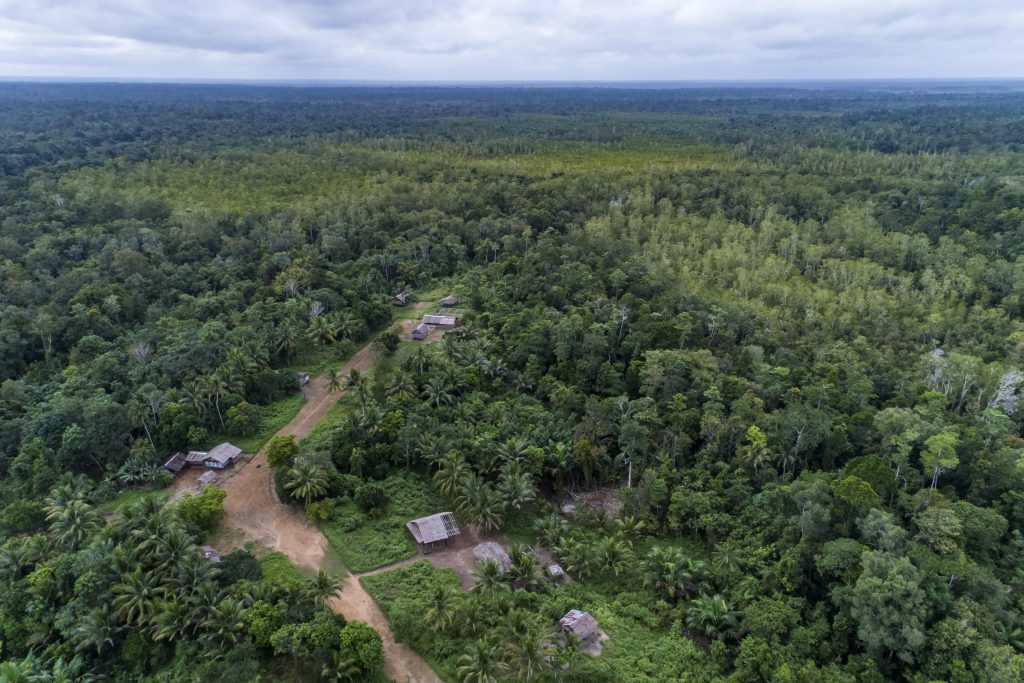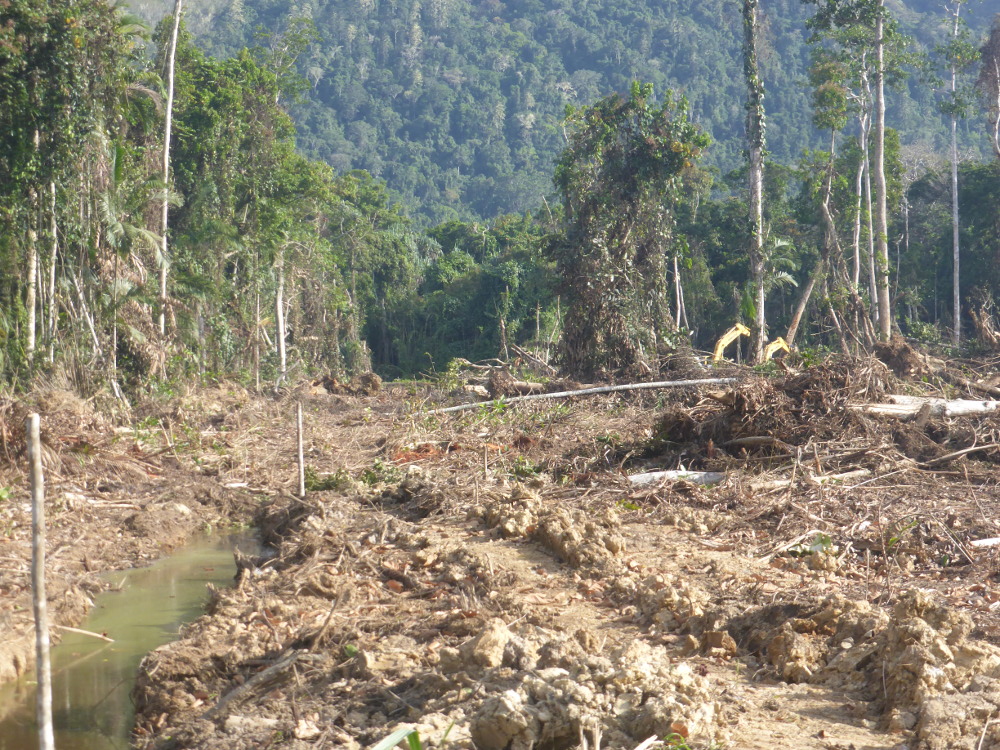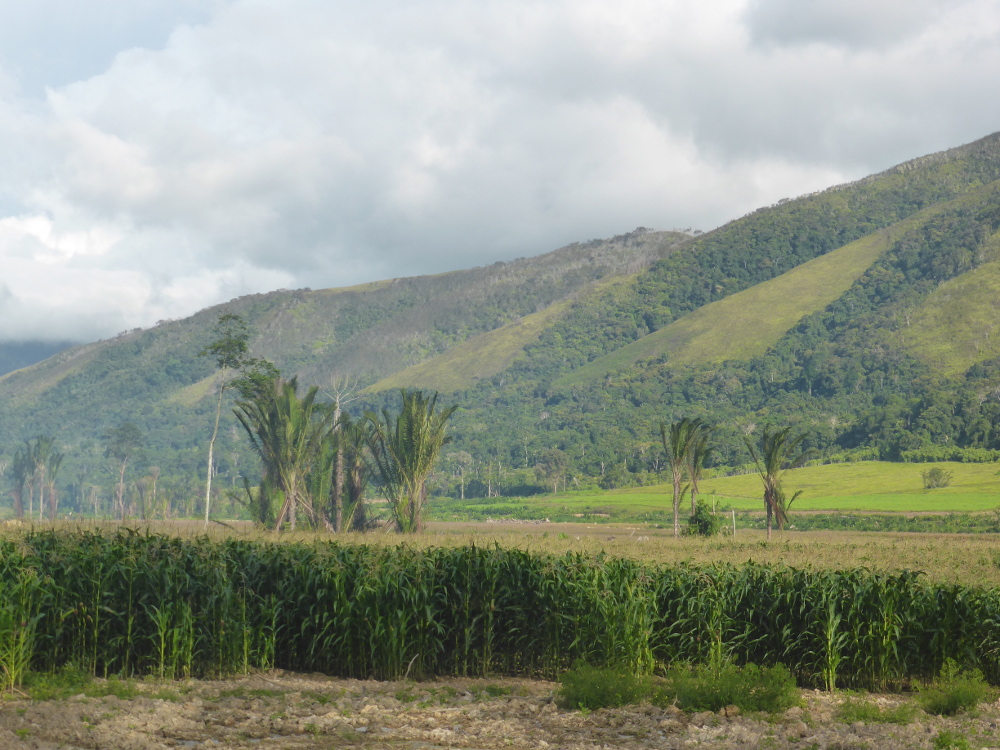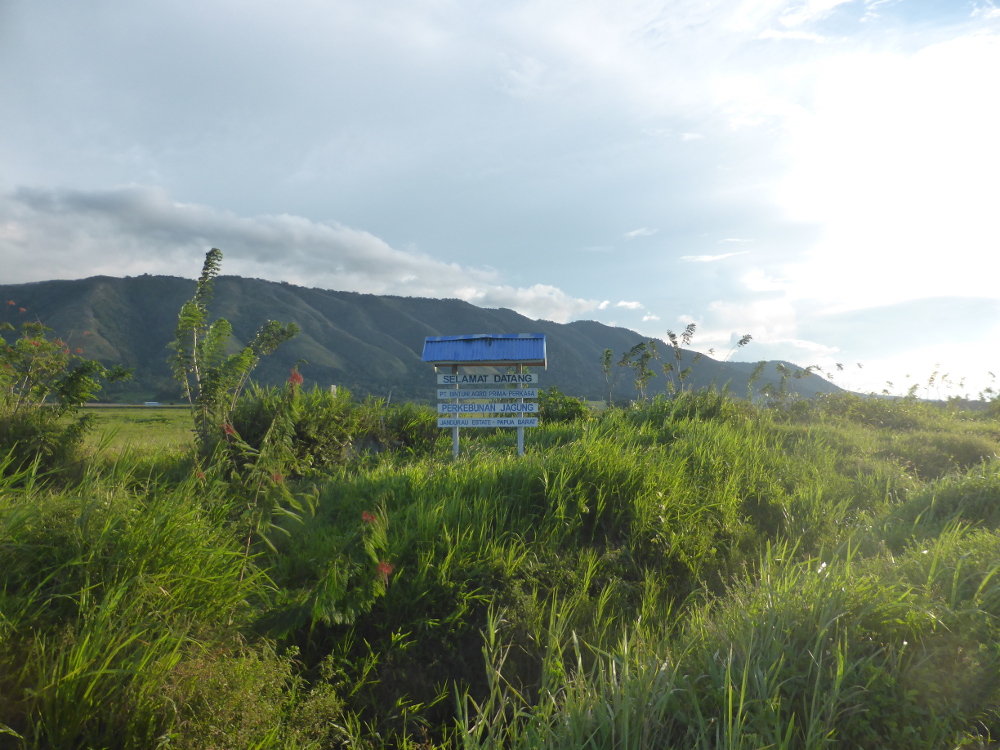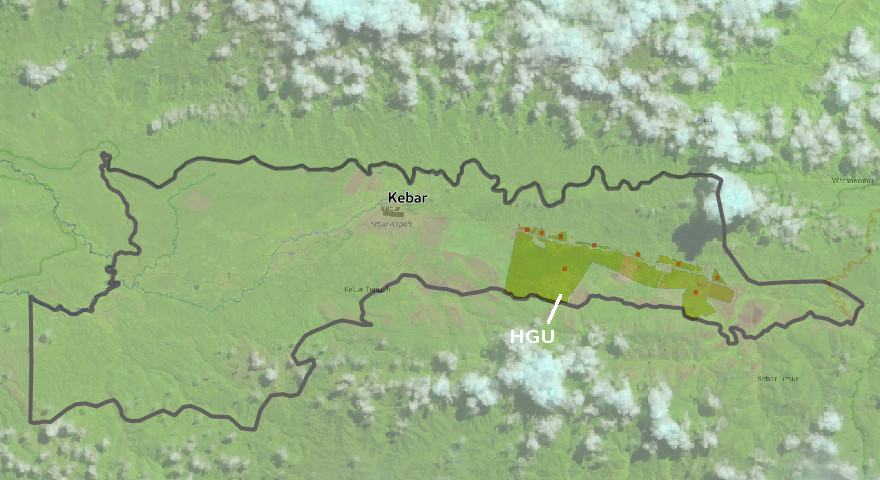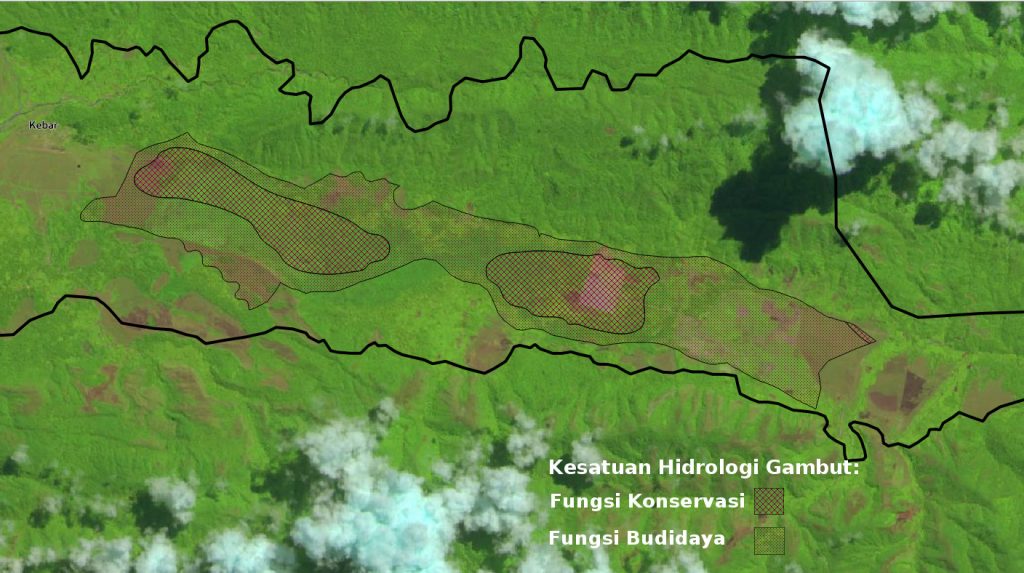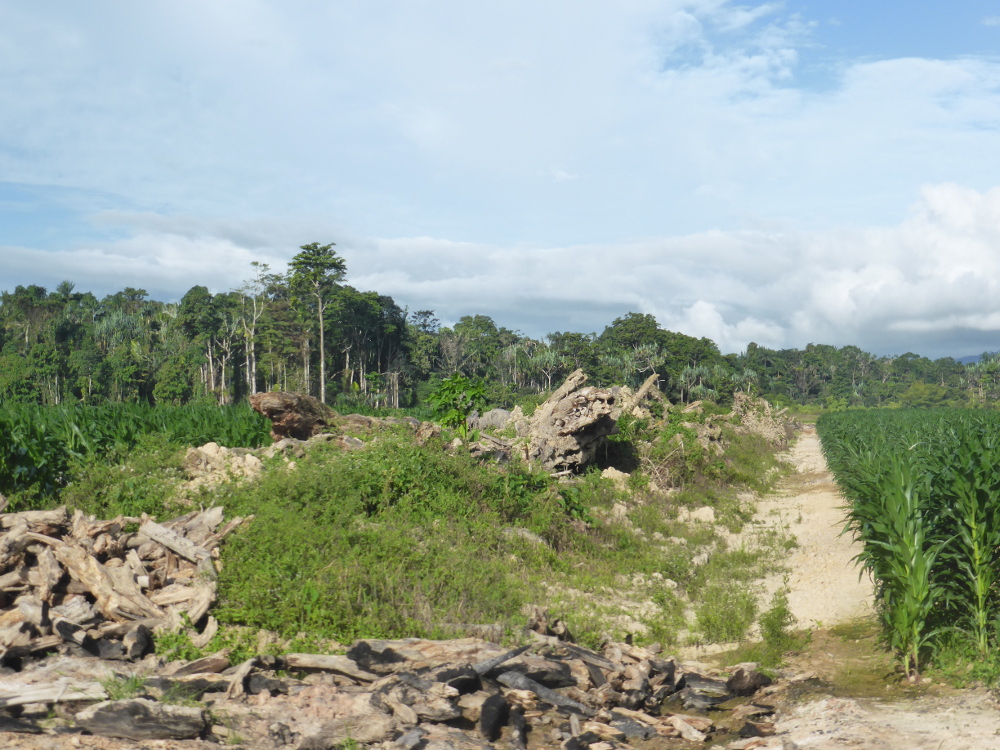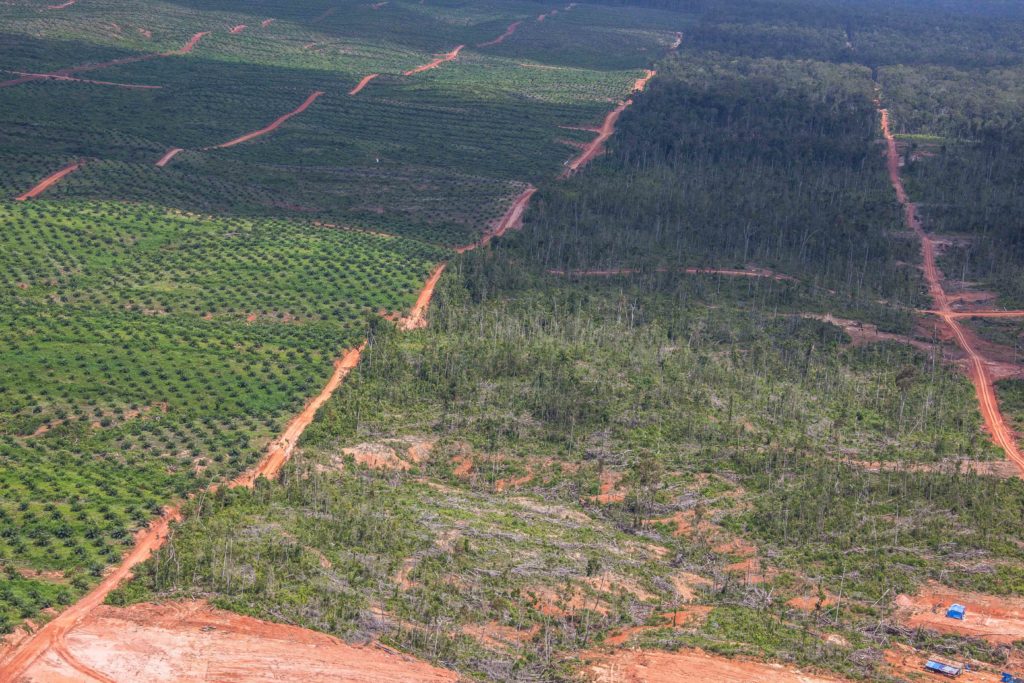
New plantation and partially cleared area in Korindo’s PT Pusaka Agro Lestari concession (Photo: Greenpeace 2018)
On 5th November 2019, the Forest Stewardship Council (FSC) released a summary of their findings into a complaint against Korindo, two and a half years after it was made. It is not the full report, since that is still withheld from publication “due to a disagreement with Korindo”. Mighty Earth, the NGO which launched a campaign against Korindo in 2016, had alleged that deforestation and violations of indigenous rights in Korindo’s palm oil concessions should mean that the FSC should not certify Korindo’s timber and plywood operations.
Mighty Earth’s argument was that the FSC’s policy on association does not allow companies to be FSC members if they or their sister companies have destroyed areas of high conservation value, converted large areas of forest to plantations, or violated any of the ILO Conventions (including ILO convention 169 which includes the right of indigenous peoples to give or withhold their free prior and informed consent).
The FSC’s findings, and the additional social and environmental research it commissioned while investigating the case, confirmed that Korindo group companies had indeed contravened its policy in all the above ways. However, it chose not to rescind Korindo’s membership or annul the sustainability certificates held by Korindo Group companies. Considering that “continued dialogue with interested stakeholders and Korindo is the best way forward towards achieving meaningful positive impacts in the company’s forestry and forestry-related operations”, the FSC proposed instead that Korindo maintains a moratorium on land-clearing in its plantation concessions and phases out the use of timber from forest conversion in its factories. Korindo will also need to undertake as-yet-unspecified remediation measures with local communities to address the lack of FPIC. If it complies, this is likely to be painful for Korindo, as the bill reportedly runs into the hundreds of millions of dollars.
Notwithstanding this process, the FSC is admitting that it will continue to certify a company which has been found to have violated its standards on sustainability. Consumers who bought Korindo’s products believing that the FSC seal of approval meant it was sustainably sourced may not be entirely happy to realise that they were actually buying from one of the companies that has cleared the largest amounts of primary forest in Indonesia over the last decade, whilst also causing severe hardship for the indigenous communities who depended on that forest. By choosing to maintain a relationship with Korindo, the FSC’s credibility as a body capable of verifying sustainable timber is severely compromised.
Astonishingly, the FSC has continued to engage with Korindo, despite the company having sent a cease-and-desist letter in September threatening legal action if it releases the full findings of its investigation. By acquiescing to Korindo’s aggressive attitude, the FSC is now unable to provide a transparent guarantee that Korindo’s products reach an acceptable sustainability standard.
So why should the FSC be willing to forgive Korindo’s deforestation and continue to certify its operations (assuming it addresses its debts to indigenous communities)? The probable answer is that Korindo not a lone bad apple: it is actually only one of many FSC-certified companies that have cleared forest and violated indigenous rights for palm oil plantations in Indonesia and elsewhere. Six other similar cases are detailed below.
Applying the principle of group-level responsibility, where companies cannot be treated as isolated entities but must be evaluated alongside other entities with common ownership, management or financial links, is a vital part of any efforts to create a real transition to sustainability. Otherwise, corporations will present their more acceptable subsidiaries for certification by the likes of the FSC or RSPO, while continuing to expand their more destructive operations under the radar. In places like Indonesia it is not always easy to establish the links between companies, as the beneficial owners are concealed behind shadow companies which track back holding companies in offshore secrecy juristictions or people who hold shares in name only. Nevertheless, part of the FSC’s job should be to conduct due diligence checks on ownership to make sure companies meet their own criteria, before accepting them as members.
Other FSC-certified forest destroyers.
Moorim Group.
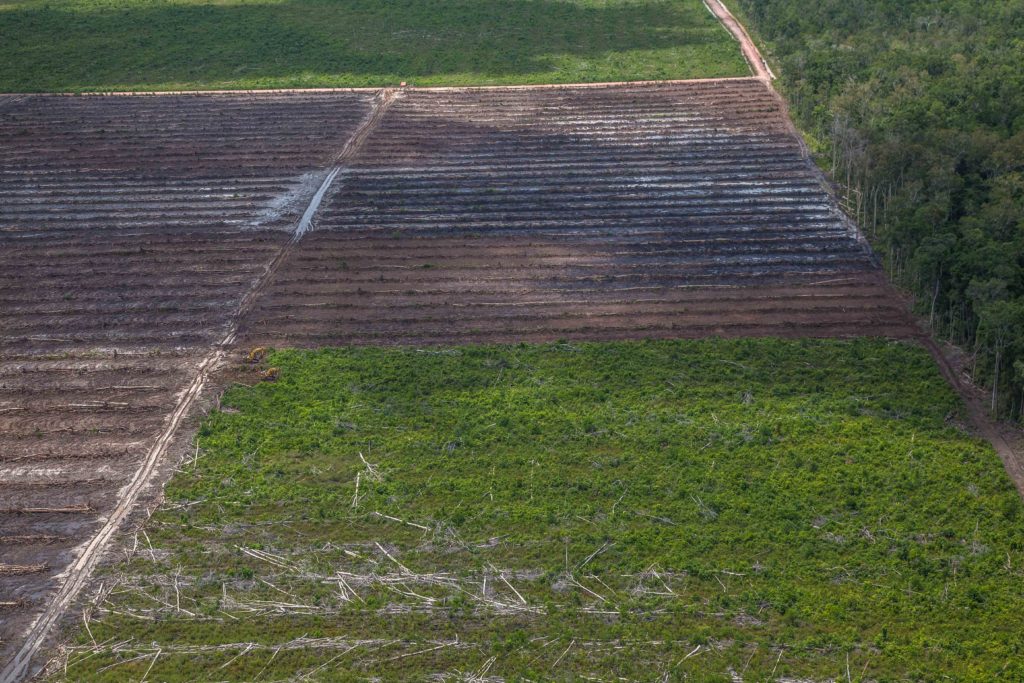
Moorim’s forest clearance in Merauke (Photo: Greenpeace 2018)
Companies with FSC Certification: Moorim P&P Co Ltd, Moorim Paper Co Ltd, Moorim SP Co. Ltd (South Korea), Moorim UK Ltd (UK), Moorim USA Inc (USA)
Companies which have cleared forest: PT Plasma Nutfah Marind Papua (Merauke, Papua, Indonesia)
PT Plasma Nutfah Marind Papua has operated an industrial forestry concession in Merauke Regency since 2015. By 2019, around 4400 hectares of natural forest had been cleared, of a 64,050 ha concession. The area where the concession is located is part of the Trans-Fly Eco-region, an area of eucalyptus forests interspersed with savannah which is unique in Indonesia.
PT Plasma Nutfah Marind Papua is a wholly-owned subsidiary of Korean FSC-certified companies Moorim P&P Co. Ltd. and Moorim Paper Co. Ltd. Moorim’s UK and USA sales divisions are also certified.
Salim Group.
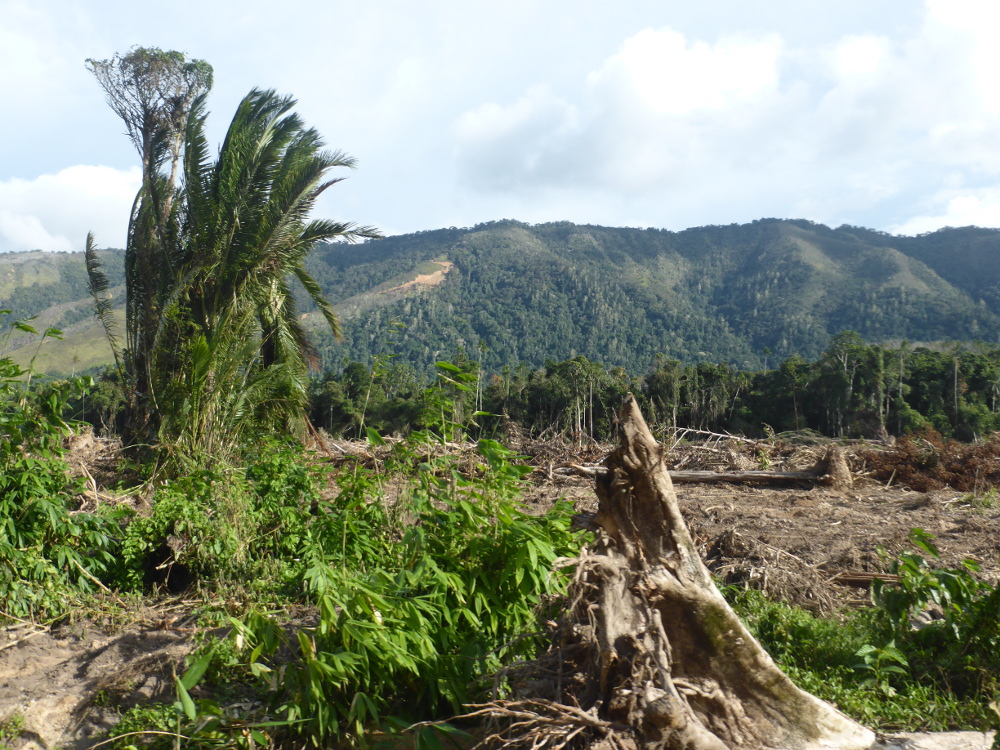
destruction of a sago grove by PT Bintuni Agro Prima Perkasa, 2018
Companies with FSC Certification: PT Rimba Mutiara Kusuma (East Kalimantan, Indonesia)
Companies which have cleared forest: PT Permata Nusa Mandiri (Papua, Indonesia), PT Rimbun Sawit Papua, PT Subur Karunia Raya, PT Bintuni Agro Prima Perkasa (Papua Barat, Indonesia), PT Duta Rendra Mulya, PT Sawit Khatulistiwa Lestari (West Kalimantan, Indonesia).
PT Rimba Mutiara Kusuma is a timber processing company based outside Samarinda which has obtained FSC certification for sawn timber and garden furniture. It is owned by Anthoni Salim, one of Indonesia’s richest men, who also controls a labyrinthine business empire across Asia.
Anthoni Salim is also the largest shareholder in PT Duta Rendra Mulya, a palm oil plantation company which has cleared at least 1720 ha of forest in Sintang Regency since 2015, mostly on peatland. Several other plantation companies which are known to be part of the Salim Group include PT Sawit Khatulistiwa Lestari, located next to PT Duta Rendra Mulia, which has cleared 5315 hectares of forest since 2015. In Papua, the Salim Group is clearing natural forest in three palm oil concessions (PT Rimbun Sawit Papua, PT Subur Karunia Raya, PT Permata Nusa Mandiri) and one corn plantation (PT Bintuni Agro Prima Perkasa). In all four cases conflicts have occurred with indigenous people who feel they have not given their free prior informed consent to the companies.
Shares in these plantation companies are formally owned by individuals other than Anthoni Salim, but operate together under the banner of the “Indogunta Group” and share management and office facilities with other Salim Group companies, including PT Rimba Mutiara Kusuma and PT Duta Rendra Mulya. It is considered highly likely that Anthoni Salim is the beneficial owner of all these companies through nominee shareholder agreements – a practice which is widespread in the Indonesian natural resource industries.
Rimbunan Hijau Group.
Companies with FSC certification: PT Wapoga Mutiara Industries (Biak, Papua, Indonesia), PT Wapoga Mutiara Timber Unit II
Companies which have cleared forest: Eastern Eden Estate (Sarawak, Malaysia), Gilford Ltd (East New Britain, Papua New Guinea).
The Rimbunan Hijau Group is one of the most notorious timber groups in the world. Owned by Tiong Hiew King and his family, it was one of the six timber companies which made their fortune snapping up timber and palm licences under the corrupt regime of Sarawak’s First Minister Abdul Taib Mahmud, which have largely destroyed all forest in Sarawak. Rimbunan Hijau then expanded to other logging operations around the world, notably in Papua New Guinea.
On Biak Island in Papua province, a Rimbunan Hijau Group company, PT Wapoga Mutiara Industries, operates an FSC-certified timber and plywood mill. PT Wapoga Mutiara Industries is owned by an offshore company in the British Virgin Islands, Kinley Trading Limited, so it is impossible to know its ultimate owner. However there are several members of the Tiong Family on its board of directors, and that of the intermediate holding company in Hong Kong, Baines Limited.
Disclosures made to the forestry industry reveal that PT Wapoga Mutiara Industries sources from two logging concessions in West Papua, PT Wapoga Mutiara Timber and PT Salaki Mandiri Sejahtera. PT WMT is FSC-certified, PT SMS isn’t. Majority shares in both companies are owned by Susan Lilianti Sunarti, an Indonesian citizen who is also on the board of PT Wapoga Mutiara Industries. Since it is illegal for foreign-owned companies in Indonesia to operate logging concessions, it is possible that Susan Lilianti Sunarti is acting as a nominee shareholder, while the Tiong family are the actual beneficial owners.
Amongst the areas where palm oil subsidiaries of the Rimbunan Hijau Group are known to have converted natural forest in recent years are the Eastern Eden Estate in Sarawak, which is owned by Jaya Tiasa Sdn Bhd, and Gilford Ltd, which has cleared over 11,000 hectares of forest in East New Britain, Papua New Guinea.
Gama Group.
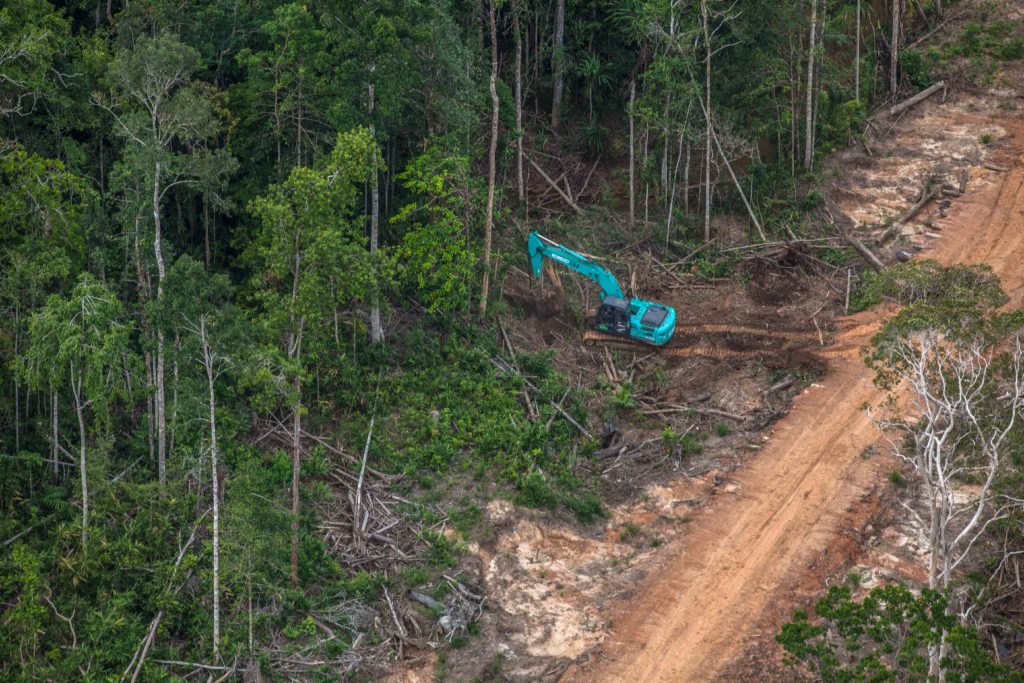
Forest clearance in PT Agrinusa Persada Mulia (Photo: Greenpeace 2018)
Companies with FSC Certification: PT Katingan Timber Celebes (Makassar, Sulawesi, Indonesia), PT Gema Hutani Lestari (Gorontalo, Sulawesi, Indonesia), PT Forestry Ganda Utama (currently suspended) (Gorontalo, Sulawesi, Indonesia)
Companies which have cleared forest: PT Agrinusa Persada Mulia, PT Agriprima Cipta Persada (Merauke, Papua, Indonesia), PT Graha Agro Mulia (Kubu Raya, West Kalimantan, Indonesia).
The Gama Group, which is now rebranding itself as KPN Corp, is the business empire of Ganda and Martua Sitorus and their families, and includes a plantation division which claims to have planted almost 200,000 hectares of oil palm. Several of these concessions were clearing forests in southern Papua and West Kalimantan until June 2018 when a Greenpeace investigation uncovered a web of entanglements between Gama and agribusiness giant Wilmar, which was also founded by Martua Sitorus. Embarrassed, Wilmar announced that it would stop buying from Gama, and Gama committed to stopping deforestation.
Although it is not acknowledged on the KPN Corp website, Gama also owns a forestry business, known as the Katingan Timber Group. A logging concession (PT Gema Hutani Lestari) is FSC certified, and two plantation forests (PT Gorontalo Citra Lestari and PT Gema Nusantara Jaya) also obtained certification through their parent company PT Forestry Ganda Utama, although it is currently suspended. A processing facility, PT Katingan Timber Celebes, is also certified.
Although Gama does appear to have made a clear commitment to embrace better practices in its palm oil operations, and has not deforested in the last year, the FSC’s policy specifically prohibits the association of companies which have cleared over 10,000 hectares of forest within the last five years. Gama’s two subsidiaries in Merauke alone have cleared 12,890 ha, according to data in CIFOR’s Papua Atlas.
Central Cipta Murdaya Group.
Companies with FSC Certification: PT Intracawood Manufacturing (North Kalimantan, Indonesia)
Companies which have cleared forest: PT Hardaya Inti Plantations (Buol, Central Sulawesi, Indonesia)
PT Hardaya Inti Plantations has a concession in Gorontalo, Indonesia. Even though a case brought by Indonesia’ Corruption Eradication Commission found the owner of the company, Siti Hartati Murdaya, guilty of bribery to obtain permits and sentenced her to prison, the concession was not revoked and has cleared 434 ha of forest. Then in November 2019, the Forestry and Environment Minister controversially released another 9964 ha of state forest for the plantation to expand further.
Siti Hartati Murdaya’s Central Cipta Murdaya Group also owns PT Intracawood Manufacturing, which has obtained FSC certification for its forestry business in North Kalimantan.
Sungai Budi Group
Companies with FSC Certification: PT Paramitra Mulia Langgeng (Ogan Komering Ulu Selatan, South Sumatera, Indonesia)
Companies which have cleared forest: PT Samora Usaha Jaya (Ogan Komering Ilir, South Sumatra, Indonesia), PT Solusi Jaya Perkasa, PT Bumi Perkasa Gemilang (Kubu Raya, West Kalimantan, Indonesia)
PT Paramitra Mulia Langgeng has FSC certification for its 70,000 hectare industrial forestry plantation in South Sumatra province. However, it is part of the same Sungai Budi Group as PT Tunas Baru Lampung, a company which operates oil palm and sugar plantations and has cleared forest and peatland in several concessions in Sumatra and Borneo in recent years.
 The awasMIFEE website was set up in 2012 to provide news on the implementation of the Merauke Integrated Food and Energy Estate, a 1.28 million hectare megaproject which had been launched by the Indonesian government in 2010. A decade later, the expansion of rice and other food crops has not been realised on the scale imagined, even though the MIFEE project has had one main impact on the ground, through the impulse it has given to the expansion of palm oil plantations in the north-east of Merauke Regency. Nevertheless, the fantasies of the Jakarta elite to flatten the forests and savannahs and drain the wetlands of swathes of southern Papua have not gone away. The spectre of the megaproject was raised once again in 2015, when President Joko Widodo visited an experimental rice project run by the Medco group. Now, since July 2020, the government has been seriously trying to revive the plans once more
The awasMIFEE website was set up in 2012 to provide news on the implementation of the Merauke Integrated Food and Energy Estate, a 1.28 million hectare megaproject which had been launched by the Indonesian government in 2010. A decade later, the expansion of rice and other food crops has not been realised on the scale imagined, even though the MIFEE project has had one main impact on the ground, through the impulse it has given to the expansion of palm oil plantations in the north-east of Merauke Regency. Nevertheless, the fantasies of the Jakarta elite to flatten the forests and savannahs and drain the wetlands of swathes of southern Papua have not gone away. The spectre of the megaproject was raised once again in 2015, when President Joko Widodo visited an experimental rice project run by the Medco group. Now, since July 2020, the government has been seriously trying to revive the plans once more




